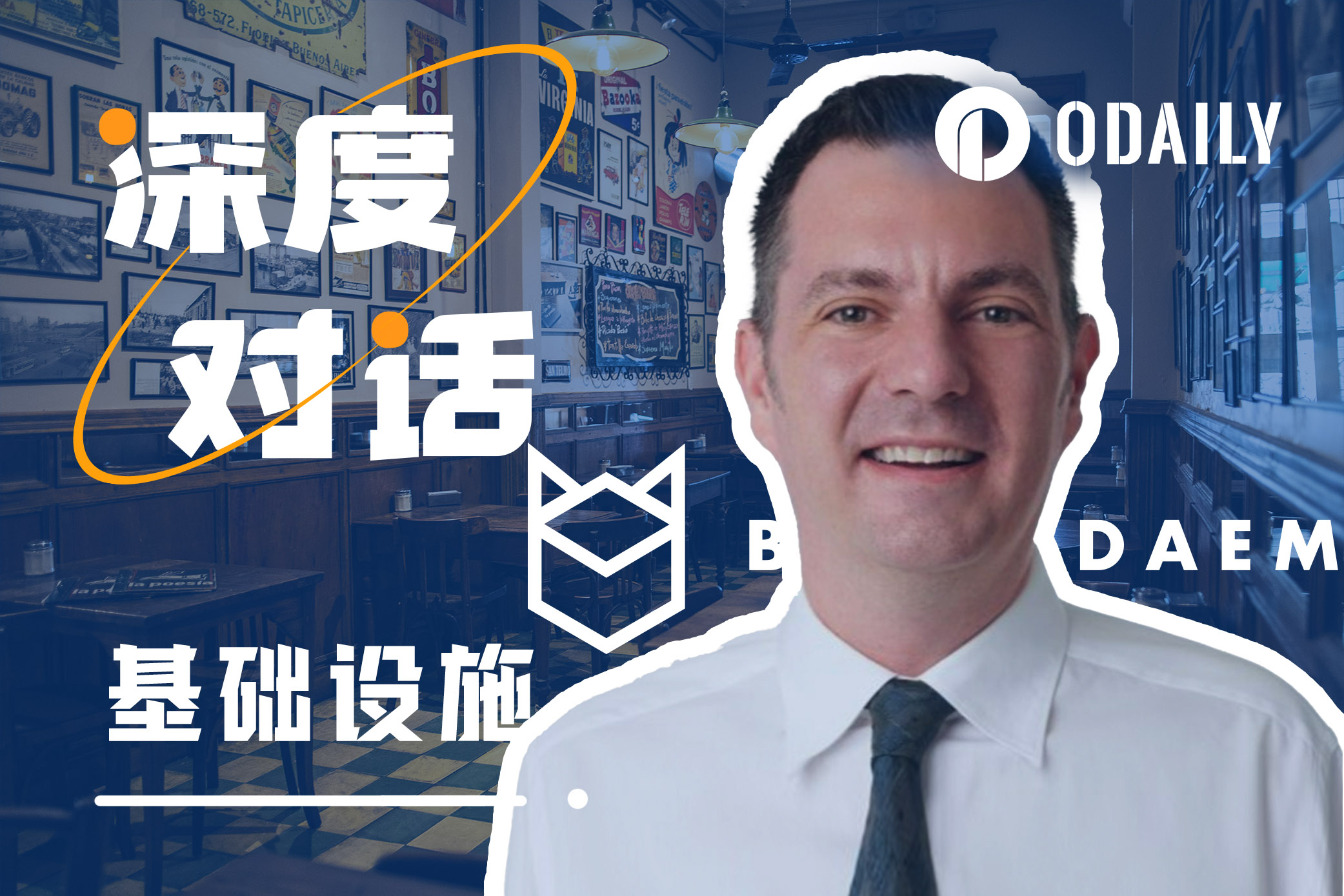Exclusive interview with Blockdaemon: How far is Web3 infrastructure from the next billion?
Original - Odaily
Author - Loopy Lu

The market has continued to be warm recently. As the dawn of the bull market gradually emerges, some more ambitious questions begin to linger in the sky of the encryption market - is the infrastructure of the encryption market sufficient to support the large-scale adoption of Web3?
Before the application layer can make new progress and bring the next billion users to the crypto world, the blockchain infrastructure must first be improved to a sufficiently developed level. At present, how far have the world facilities in the blockchain world developed?
Blockdaemon is a leader in the infrastructure field. Recently, Odaily interviewed Andrew Vranjes, Vice President of Sales and General Manager of Blockdaemon Asia Pacific. He reveals to us the latest developments in the field of infrastructure.
Blockdaemon is a leading blockchain infrastructure platform focusing on node management and blockchain technology applications. As a global company, Blockdaemon supports businesses of all sizes, from startups to large enterprises, all of whom can benefit from their services. Blockdaemons mission is to accelerate the global adoption of blockchain technology by lowering the barrier to entry through its efficient and secure infrastructure.
Recently, Blockdaemon made an important update to the institutional wallet, introducing cold storage and tokenization capabilities, once again proving their expertise in providing safe and reliable blockchain services. In terms of the Ethereum ecosystem, Blockdaemon has launched an ETH pledge service for institutions, enhancing its service scope and market influence.
The following is the transcript of the interview, compiled and edited by Odaily:
Odaily: I know youve worked at large enterprises like AWS, Cisco, etc. How did you get involved in the crypto world? Is this industry any different from large tech companies?
Andrew Vranjes:There are many differences between the crypto world and traditional companies. Cisco gave me the opportunity to build domain knowledge in the technology enterprise, and I still maintain close ties with some people at Cisco.
Previously, I worked for system integrators and telecommunications companies. And having been at Cisco for almost 6 years, its a great company. At Cisco I was involved in various products, projects, and Cisco acquisitions. But I wanted to be closer to founders and the venture capital community. Later, through my network, I joined Amazon Cloud Computing (AWS) Asia and was responsible for business development in entrepreneurship and venture capital.
I thought this was going to be a golden age for Web 2.0 startups in Asia, and it was - there was an influx of capital and talent. A large number of unknown digital platforms have gone from scratch to become household names. Such as Grab, Shopback, etc. All of these have become iconic platforms in the Web 2.0 space in Southeast Asia.
I have been working at AWS for more than 5 years, building a large number of Asian teams related to entrepreneurship, cryptocurrency, and venture capital. This made me realize that crypto-native companies are growing rapidly.
Then I thought - Hey, I want to do blockchain!
So I got into the blockchain space. I joined Blockdaemon in January 2022 to run the Asia Pacific business and report to the CEO and it has been an amazing journey I see myself as a leader in the technology infrastructure space. I make sure that I am a practitioner in all areas of infrastructure, whether it is telecom, internet or blockchain.
Odaily: You were once responsible for the Asian market and have an in-depth understanding of the Asian market. Could you please tell us about your experience in Asia? How is it different from Australia?
Andrew Vranjes:Ive spent a lot of time in Asia, Ive been to Japan, Korea, Hong Kong, India, Southeast Asia, and Ive found that the way of doing business in Asia is very different from Australia. I have been working in Singapore for almost 13 years and for over 20 years for US companies.
I grew up in Perth, Western Australia and have been interested in technology since I was a child. I was very lucky that I had the opportunity to play with computers because my father bought me a Commodore 64, Atari, Amiga, Apple Mac, IBM PC, etc. But Perth is not a tech hub.
So in my 20s I moved to Melbourne. At that time, I was working for a systems integrator. Long story short, I ended up running their data center and cloud computing business, and that was my last role in Melbourne. After that I was traveling back and forth between Singapore, Sydney and Melbourne, which was very heavy and crazy travel.
Odaily: There is a phenomenon in the cryptocurrency industry: rich infrastructure, but lack of applications for individual customers. There may be more infrastructure than applications. How does Blockdaemon view the current blockchain services market?
Andrew Vranjes:We are a B2B company and do not deal with individuals. We only serve businesses. Our clients include large crypto-native companies like Coinbase, as well as some large DEX or DeFi protocols.
Blockdaemon supports many foundations such as Ethereum, Solana, Polkadot, etc. In Asia, we also support gaming protocols and gaming company WeMix in South Korea, for example.
We support very large crypto-native companies, but also very large FinTech-native companies like PayPal, Revolut, Stripe, etc. Blockdaemon provides product support to these companies and also supports traditional enterprises and financial services companies entering the blockchain space.
Blockdaemon hasthree business areas, the first one is our blockchain access business, including nodes and APIs. We provide enterprises with innovative solutions to securely access blockchain with integration, performance, reliability and scalability, all the features large enterprises require.
The second business area involves PoS. We provide PoS services for 30 protocols. Blockdaemon is on the marketFirst to offer PoS insurancecompany of. We offer multiple ways to deliver PoS services to large enterprises, including traditional wallet delegated transactions, as well as our middleware Proof of Stake API solution that is extremely scalable. (For example, you can order 250 Ethereum verification nodes from us at one time now and save more than 2000 times the gas fee.)
We provide solutions for connecting wallets, providing MPC-related security including key management, and more. We are one of the market leaders in cryptography and MPC key management. Some of the largest digital banks are using our MPC security technology.
alreadyYear 2008, Blockdaemon made the first attempt at MPC, which is why the largest banks and the largest crypto-native companies have chosen to cooperate with us. We have reliable, secure, scalable MPC solutions.
Odaily: MPC is very popular right now. Can you give us a brief introduction to the current situation of this track?
Andrew Vranjes:Currently, there are many MPC solutions on the market. But when you peel back the surface and get into the details, there are only three or four companies that have very strong cryptography teams.
Please note that I putcryptography teamSeparate from software developers, these two items arevery differentof. Many companies only have a few software developers, build a wallet around the open source MPC and release it.
There are pros and cons to this approach. Key management for open source MPC is public. So someone trying to carry out an attack, first they can know your code base. I think this is an issue worthy of consideration by customers.
We work with a wallet service provider called Atato for key management. For them, security, scalability, reliability, etc. are all very important. We support several of the worlds leading wallet service providers.
We have many customers who also use this key management. Circle uses MPC key management, which is also used by Atato in Thailand, Liminal in Singapore, CoinDCX in India, and Crayon Data in Singapore.
Odaily: What is the strategic purpose of the partnership between Blockdaemon and Ledger, and how does this impact the company’s overall product portfolio?
Andrew Vranjes:We are very excited about our partnership with Ledger. Ledger is the OG in the hardware wallet space and is very famous.
We are very fortunate to work with established companies in this space. We are very excited about our partnership with Ledger.
Ledger is the OG in the hardware wallet space. For Blockdaemon, we are a B2B business and we will work with Ledger’s enterprise customers and institutional customers who will use Ledger Enterprise Edition to participate in blockchain verification.
Odaily: What impact will Blockdaemon’s partnership with Ledger have on institutional investors?
Andrew Vranjes:There are still many opportunities in the institutional space in the cryptocurrency space. This also requires stricter security, compliance, auditing, insurance, etc. These are the values of Blockdaemon.
Odaily: How is the current business of Blockdaemon institutional wallet? As far as I know, more institutions prefer crypto-custody solutions. Why use an institutional wallet instead of a custody service?
Andrew Vranjes:BNY Mellon, the world’s largest custodian, is a Blockdaemon client.
We also have customers like Seba Bank (Odaily’s note: a crypto bank established in Switzerland) and Revolut (Odaily’s note: a FinTech company famous for its international remittance business).
We work a lot with these companies on PoS. Revolut users don’t need to know about Blockdaemon, but Revolut just wants a trustworthy partner to help them with their PoS services. This is what we do.
Blockdaemon is like a process running on the Linux operating system, it just silently helps you in the background. Were the ones working quietly in the background, powering the worlds largest institutions. And its open and has a huge ecosystem, just like Linux.
Our clients include Goldman Sachs, JPMorgan Chase and Citibank as investors and clients. The ecosystem of SBI (Odaily note: Japanese financial giant) is also our supporter. We have many collaboration options with SBI. We are also very lucky to own some of the OG crypto funds such as HashKey Capital, Fenbushi Capital, and Dragonfly.
In Thailand, this includes local crypto OG companies – Bitkub, CryptoMinds and Atato. (Odaily note: This interview was conducted in Thailand.)
Odaily: Blockdaemon supports over 40 chains. Is the technical team very large and powerful? Can you briefly introduce the technical team?
Andrew Vranjes:Let me start by describing the size of our business -We run over 120,000 nodes covering 60 protocols. Imagine that a significant portion of all transactions that are happening are processed through Blockdaemon nodes around the world.
Our CTO, Chris Sharp, used to work at Apple and he built Apple Pay. We have a very strong engineering team.
As you know, Blockdaemon serves large organizations and our sales team is actually very small. Our team is mostly engineering and product talent, and we use engineers to build products for large cryptocurrency, digital native companies, as well as large traditional companies looking to enter this space. Blockdaemon is very engineering oriented and has very good engineers.
Odaily: What is Blockdaemon’s competitive advantage among similar companies? How does it maintain this position?
Andrew Vranjes:Why do so many customers use Blockdaemon? Like I said, we have 100% penaltiesInsurance, this service is guaranteed by the market leader.
Many companies will have the insurance policy audited before choosing us. We have our own monitoring and assurance tools. We can monitor and manage the uptime and performance of 125,000 active nodes. This number is a sizable portion of all nodes globally.
We operate a vast array of infrastructure and clouds to provide customers with diverse solutions.
When it comes to APIs, what makes us unique is that we provide universal API solutions. Whether youre using Ethereum, Polygon, Solana, Polkadot, developers can use the same code syntax to build onto our common API. Developers can quickly switch to different chains without changing their dApp.
Blockdaemons general API currently supports around 18 protocols, which can be found atAlmost all chainsWork. This allows developers to move freely in the crypto world without having to undergo massive code refactoring when changing the blockchain later.



